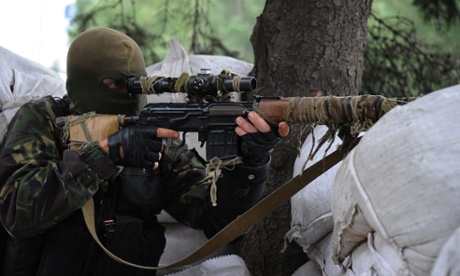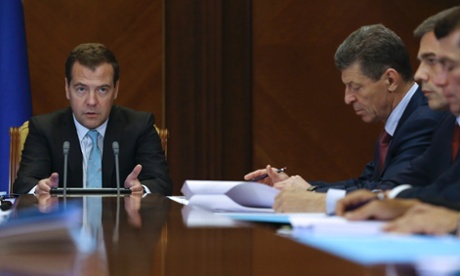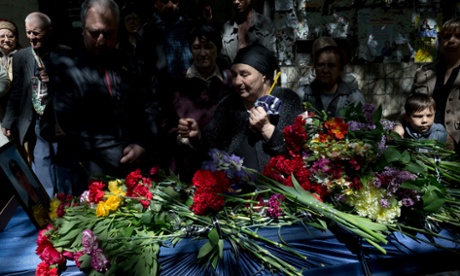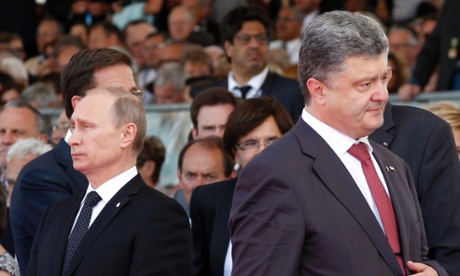We know that the strategy of the FED was to pump in money and inflate the value of the assets of the rich, especially the Stock Market. Then, when the economy has recovered, cut back on money printing (which 'money' is used to buy up bonds to keep interest rates low). In order to delay a Market crash and to delay the rise in interest rates, the FED printed excess money. This excess money should last a few months until the Regime gets past the election.

Eastern Ukrainian separatists have emerged as Russian President Vladimir Putin’s biggest critics in the past few weeks.
Their pleas for Russia to intervene militarily have been ignored. Moreover, as they were pleading for help, Putin turned to his legislature and asked it to rescind his mandate to use military force in Ukraine.
This modest policy change in Moscow was reaffirmed in the Berlin agreement on 2 July, which called for a ceasefire and new talks aimed at resolving the conflict. The key element of the new agreement is strengthening control of the Russian-Ukrainian border amid the closure of border checkpoints and incidents of shelling on Russian territory from the Ukrainian side of the border. Kiev and Western governments are intent on sealing the border and cutting off the separatists’ supplies. If implemented, this will be an important gesture by Moscow amid Kiev’s stepped-up campaign of so-called anti-terrorist operations.
It is also noteworthy that the word “junta” has disappeared from Russian state media’s descriptions of the government of Ukraine. In addition, Ukraine and Russia have held new talks about gas deliveries and future plans for Crimea. In retrospect, the build-up of Russian troops along the border in recent weeks appears to have been a face-saving act, or even a hedge against the possible movement into Russia of fighters from eastern Ukraine.
Putin’s policy shift makes sense for a number of reasons, but could be delicate for him domestically, even though many Russians prefer supporting eastern Ukraine via economic and military aid over invading.

First, unlike in Crimea, local support for establishing a quasi-state in southern and eastern Ukraine under the name of Novorossiya has been weak. Ukrainians have united in opposition to Russia. The government has moved to re-build the armed forces and succeeded in organising credible presidential elections despite the chaos in the east.
The tragic events in Odessa, in which dozens of people died in a fire and street fighting, proved to be a turning point. Instead of fueling pro-Russian sentiments, the Odessa events further mobilised Ukrainians against continued Russian efforts to destabilise key oblasts.
The tragic events in Odessa, in which dozens of people died in a fire and street fighting, proved to be a turning point
Second, Russia’s failure to fulfill quickly the promise of a better life for Crimea has cut into support for Moscow in southern and eastern Ukraine. The number of Russians supporting the idea of defending ethnic Russians in neighbouring countries or annexing territories where they live has significantly declined since March.
Third, Moscow has not been able to find credible political leaders in Ukraine to take ownership of the Novorossiya project. Russia’s reliance on Viktor Medvedchuk, the unpopular chief of staff of former President Leonid Kuchma, as the proxy for Putin is indicative of Russia`s weakening political position in Ukraine. Putin’s desire to get Medvedchuk, with whom he has strong personal ties, into Ukrainian politics is likely to keep Russia’s position weak. Medvedchuk is simply not electable; Moscow’s concept of federalisation is supported only by 13% of Ukrainians.

Fourth, a continuing military conflict in eastern Ukraine poses a growing threat to stability inside Russia itself as the fighting could spill across the border.
Fifth, Moscow is not keen to subject itself to further economic, reputational and other damage from international sanctions amid its own declining economic performance. The Kremlin understands, of course, that Europe is reluctant to introduce new sanctions and wants to take advantage of the new opening to avoid them.
With little insight into Kremlin decision-making, one can only speculate about the connection between Russian politics and events in Ukraine: Crimea’s annexation was a victory for the siloviki, and they took the lead in re-shaping Russian foreign policy. Now it appears that “soft power advocates” (Volodin, Surkov, Chesnakov, etc) may be gaining at their expense. The Kremlin’s current strategy relies more on soft, rather than on military power, a move which may allow Moscow to move away from the threat of further territorial expansion to an expansion of Russia’s long-term influence in Ukrainian politics.
Nonetheless, the destabilisation of Ukraine is by no means off the table in Moscow. But the two imminent goals — a gas deal and a workable modus vivendi for Crimea — require agreements with the new Ukrainian government. Crimea cannot be turned into a success story unless water, electricity, gas and food supplies flow from Ukraine. And Moscow is more than capable of exploiting Ukraine's overwhelming challenges and internal political fragmentation by political means.
In Poroshenko, Putin has acquired a legitimate partner who speaks out on behalf of peace

Even though the prolonged ceasefire resulted in two rounds of negotiations and the freeing of eight OSCE observers, it also took the lives of 27 Ukrainian soldiers. Further inaction might have caused Poroshenko a loss of trust among many Ukrainians who see the eastern Ukraine insurgency as a conflict with Russia. As a result, he had no choice but to end the ceasefire even though his use of military force may strengthen support for federalisation in the region in the near term. The rapidly growing refugee crisis — with residents fleeing eastern Ukraine to other parts of the country as well as to Russia — is a reminder of the seriousness of the conflict.
Thus, both Poroshenko and Putin have to walk a very fine line because of their respective domestic political situations. Perhaps Moscow will realise that Poroshenko could gain much-needed political capital if he can deliver a military victory that would empower him to make the deals that Russia needs and wants from him. The ball is in Putin’s court.
Balázs Jarábik is a visiting scholar at Carnegie Endowment for International Peace focussing on Ukraine and eastern Europe
AJ adds: Both Putin and Poroshenko are playing a chess game that can go bad any time. To be sure, challenge of Russia's annexation of Crimea would amount to war and not just between Russia and the Ukraine, but possibly NATO and Russia. Then there is the problem of supplying the Crimea. This problem may push Russia to occupy East and South East Ukraine, if the problem is not resolved soon. For now, Mr Putin is making friends in Latin America such as getting deals of nuclear power with Argentina. Come this weekend, he should be home and taking a new look at the Ukraine. In the meantime, Poroshenko is overplaying his game by using heavy weapons in E Ukraine. We live in interesting times.




